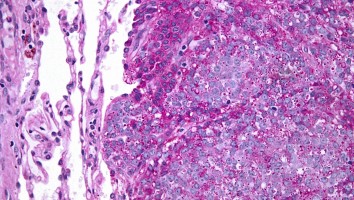
Use of high-dose ifosfamide (Ifex) was found to be superior for treating recurrent and primary refractory Ewing sarcoma compared to three other standard-of-care treatments that are used for the disease, according to research that will be presented at the 2022 American Society of Clinical Oncology (ASCO) Annual Meeting.
The rEECur study, the first trial to provide comparative toxicity and survival data for the four most commonly used chemotherapy regimens in recurrent and primary refractory Ewing sarcoma, showed that high-dose ifosfamide prolonged median event-free survival by 5.7 months compared to 3.7 months for topotecan plus cyclophosphamide. Median OS was 16.8 months for ifosfamide vs. 10.4 months for topotecan plus cyclophosphamide.
A greater survival difference was observed for patients under age 14 than those 14 and older.
In earlier phases of the trial, irinotecan plus temolozomide and gemcitabine plus docetaxel were found to be inferior to ifosfamide and those enrollment arms were dropped from the trial.
Ifosfamide led to more brain and kidney toxicity than topotecan plus cyclophosphamide.
Both ifosfamide and topotecan plus cyclophosphamide led to similar febrile neutropenia (fever and a lower-than-normal number of neutrophils, a type of white blood cell) in 26% and 25% of patients, respectively.
Quality-of-life scores favored ifosfamide over topotecan plus cyclophosphamide in children but not in adults.
“The rEECur study has, for the first time, accrued randomized data for four widely used chemotherapy regimens and is now accruing data for a fifth regimen. Before the rEECur study, the basis for choosing drugs for patients with relapsed or refractory Ewing sarcoma was weak and lacking randomized trials to inform clinicians or patients about which treatments were most effective and/or most toxic,” said lead author Martin McCabe, MD, PhD, who is a clinical senior lecturer in paediatric and adolescent oncology at the University of Manchester, England.
Ifosfamide, first approved for use in the United States (U.S.) in 1987, works by adding an alkyl group to DNA, leading to an eventual breaking of DNA strands and affecting the ability of cancer cells to multiply.
Watch Dr McCabe's interview on the study here
Watch Dr McCabe's press conference on the study here
Watch Dr Gralow comment on the study here
The current five-year survival rate of recurrent and primary refractory Ewing sarcoma is about 15%.
Ewing tumours are uncommon as only about 200 children and teens are diagnosed with i the disease in the U.S. each year .
The phase II/III rEECur trial randomly assigned patients in Europe, ages 4 to 50 (median age of 19) with recurrent and primary refractory Ewing sarcoma to either topotecan plus cyclophosphamide, irinotecan plus temolozomide, gemcitabine plus docetaxel, or high-dose ifosfamide.
The primary outcome was event-free survival in the phase III comparison.
Secondary outcomes included reviews of responses by imaging, OS, toxicity, and quality of life.
At the first and second interim assessments, patients receiving irinotecan plus temolozomide and gemcitabine plus docetaxel had worse objective responses and event-free survival than the other treatments, thereby halting recruitment to both groups.
The final assessment was a phase III evaluation of topotecan plus cyclophosphamide vs. ifosfamide.
Median follow-up was 40 months.
The regimens were chosen because they were the most widely used regimens for recurrent/refractory Ewing sarcoma in Europe at the time the trial was established.
These choices were important as some regimens, notably irinotecan plus temolozomide and topotecan plus cyclophosphamide, were being used as the chemotherapy backbone in trials with molecularly targeted agents.
The trial is continuing to recruit patients to the ifosfamide arm.
It has also added a fifth chemotherapy arm that includes carboplatin and an etoposide, an agent which can damage DNA.
The investigators plan to introduce a new arm involving a molecularly targeted therapeutic later this year.
“Data showing the impact of ifosfamide on improved overall survival for patients with recurrent and primary refractory Ewing sarcomaare potentially practice changing. Prior to this trial, no direct comparison of the most commonly available regimens were available to help guide treatment choices. Findings from the rEECur trial could help physicians talk with patients and their families about the likelihood of response, survival, and toxicity for each regimen available for relapsed Ewing sarcoma based on objective, randomized data,” said Vicki L. Keedy, MD, MSc, ASCO Expert in sarcoma.
Source: ASCO
The World Cancer Declaration recognises that to make major reductions in premature deaths, innovative education and training opportunities for healthcare workers in all disciplines of cancer control need to improve significantly.
ecancer plays a critical part in improving access to education for medical professionals.
Every day we help doctors, nurses, patients and their advocates to further their knowledge and improve the quality of care. Please make a donation to support our ongoing work.
Thank you for your support.